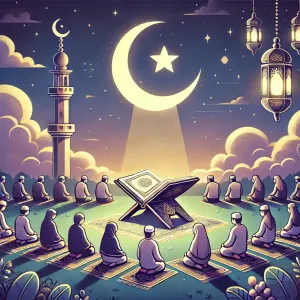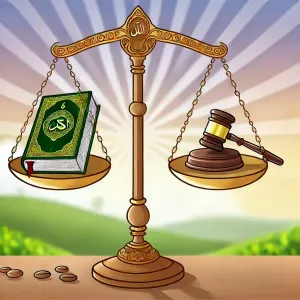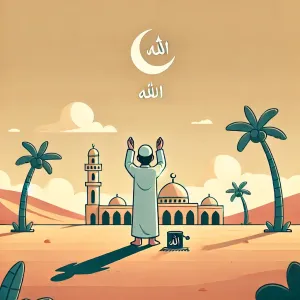In Islam, belief in the afterlife is one of the core elements of faith. The Islamic view of life is that it is a test, with every action, thought, and decision contributing to a person’s ultimate fate in the Hereafter. Muslims believe that life on Earth is temporary and serves as a preparation for the eternal life that follows after death. The concept of resurrection, the Day of Judgment, Heaven (Jannah), and Hell (Jahannam) forms the foundation of how Muslims view morality, purpose, and destiny.
The Quran and the teachings of the Prophet Muhammad (peace be upon him) provide detailed descriptions of the afterlife, offering both warnings and hope. This article will explore what Muslims believe about life after death, including the stages of the afterlife, the Day of Judgment, and the realities of Heaven and Hell.
1. The Importance of Belief in the Afterlife
Belief in the afterlife is one of the Six Articles of Faith in Islam. Muslims are required to believe in:
- Allah (God)
- The Angels
- The Divine Scriptures
- The Prophets
- The Day of Judgment
- Divine Decree (Qadar)
The belief in life after death serves as the basis for many of the ethical and moral teachings in Islam. Muslims believe that everything they do in this world will have consequences in the next life, and that their actions are constantly being recorded by angels. This awareness of the afterlife encourages Muslims to act righteously, seek forgiveness for their sins, and strive for eternal salvation.
The Quran emphasizes the reality of the afterlife and warns against those who deny it:
﴿وَقَالُوا مَا هِيَ إِلَّا حَيَاتُنَا الدُّنْيَا نَمُوتُ وَنَحْيَا وَمَا يُهْلِكُنَا إِلَّا الدَّهْرُ ۚ وَمَا لَهُم بِذَٰلِكَ مِنْ عِلْمٍ ۖ إِنْ هُمْ إِلَّا يَظُنُّونَ﴾
[ الجاثية: 24]
"And they say, 'There is nothing but our worldly life; we die and live, and nothing destroys us except time.' And they have of that no knowledge; they are only assuming."
(Quran 45:24)
For Muslims, the afterlife is not merely a spiritual concept but a certainty that shapes their daily actions and intentions. They believe that death is not the end but the beginning of a new, eternal existence.
2. The Journey of the Soul After Death
Muslims believe that the soul continues to exist after death, and that the time in the grave is the first stage of the afterlife. Upon death, the soul leaves the body and begins its journey toward its final destination—either paradise (Jannah) or hellfire (Jahannam)—depending on the individual’s faith and deeds.
The Grave: Barzakh
The period between death and the Day of Judgment is known as Barzakh, which refers to the state of existence in the grave. During this time, the soul remains in a state of either peace and comfort or torment, depending on the person’s life and faith.
The Prophet Muhammad (peace be upon him) taught that after burial, a person is questioned by two angels, Munkar and Nakir, about their belief in Allah and their deeds. A righteous person will find comfort and peace in the grave, while the unrighteous will face torment until the Day of Judgment. The Quran briefly alludes to this intermediate state:
﴿لَعَلِّي أَعْمَلُ صَالِحًا فِيمَا تَرَكْتُ ۚ كَلَّا ۚ إِنَّهَا كَلِمَةٌ هُوَ قَائِلُهَا ۖ وَمِن وَرَائِهِم بَرْزَخٌ إِلَىٰ يَوْمِ يُبْعَثُونَ﴾
[ المؤمنون: 100]
"And behind them is a barrier [Barzakh] until the Day they are resurrected."
(Quran 23:100)
The grave is viewed as a precursor to what awaits in the Hereafter, serving as either a place of tranquility for the believer or a place of suffering for those who denied the truth.
3. The Day of Judgment: Yawm al-Qiyamah
The Day of Judgment (Yawm al-Qiyamah) is a pivotal event in Islamic eschatology. Muslims believe that on this day, all human beings will be resurrected from their graves and gathered for a final judgment. On this day, Allah will judge every individual based on their deeds, intentions, and faith, determining their eternal destiny.
The Signs of the Day of Judgment
The Quran and Hadith provide descriptions of the signs that will precede the Day of Judgment. These signs are divided into minor signs, which have been occurring throughout human history, and major signs, which signal that the Day of Judgment is near. Some of the major signs include the appearance of the Dajjal (the false messiah), the return of Jesus (Isa), and the rising of the sun from the west.
The exact timing of the Day of Judgment is unknown, and only Allah has knowledge of when it will occur:
﴿إِنَّ اللَّهَ عِندَهُ عِلْمُ السَّاعَةِ وَيُنَزِّلُ الْغَيْثَ وَيَعْلَمُ مَا فِي الْأَرْحَامِ ۖ وَمَا تَدْرِي نَفْسٌ مَّاذَا تَكْسِبُ غَدًا ۖ وَمَا تَدْرِي نَفْسٌ بِأَيِّ أَرْضٍ تَمُوتُ ۚ إِنَّ اللَّهَ عَلِيمٌ خَبِيرٌ﴾
[ لقمان: 34]
"Indeed, Allah [alone] has knowledge of the Hour."
(Quran 31:34)
The unpredictability of the Day of Judgment serves as a reminder for Muslims to live with piety and sincerity, always mindful of the eventual resurrection and judgment.
The Scale of Deeds and the Book of Records
On the Day of Judgment, every individual’s deeds will be weighed on a scale (Mizan), with their good and bad deeds determining their fate. The Quran describes the weighing of deeds:
﴿وَالْوَزْنُ يَوْمَئِذٍ الْحَقُّ ۚ فَمَن ثَقُلَتْ مَوَازِينُهُ فَأُولَٰئِكَ هُمُ الْمُفْلِحُونَ﴾
[ الأعراف: 8]
"And the weighing [of deeds] that Day will be the truth. So those whose scales are heavy—it is they who will be successful."
(Quran 7:8)
Each person will also be given their book of deeds, which contains a record of all their actions during their lifetime. The Quran mentions that the righteous will receive their book in their right hand, symbolizing success, while the wicked will receive it in their left hand or behind their backs, symbolizing failure:
﴿فَأَمَّا مَنْ أُوتِيَ كِتَابَهُ بِيَمِينِهِ﴾
﴿فَسَوْفَ يُحَاسَبُ حِسَابًا يَسِيرًا﴾
﴿وَيَنقَلِبُ إِلَىٰ أَهْلِهِ مَسْرُورًا﴾
﴿وَأَمَّا مَنْ أُوتِيَ كِتَابَهُ وَرَاءَ ظَهْرِهِ﴾
﴿فَسَوْفَ يَدْعُو ثُبُورًا﴾
﴿وَيَصْلَىٰ سَعِيرًا﴾
[ الانشقاق: 7-12]
"Then as for he who is given his record in his right hand,
He will be judged with an easy account.
But as for he who is given his record behind his back,
He will cry out for destruction."
(Quran 84:7-12)
This moment marks the ultimate reckoning, where individuals will see the consequences of their actions and face the eternal outcome.
4. Heaven (Jannah): The Eternal Paradise
Jannah, or paradise, is the ultimate reward for the righteous and pious believers. It is described in the Quran as a place of eternal bliss, where those who worshiped Allah and lived righteous lives will be granted peace, happiness, and rewards beyond human comprehension.
Descriptions of Jannah
The Quran provides vivid descriptions of Jannah, painting a picture of a beautiful and serene place filled with lush gardens, flowing rivers, and eternal pleasures. It is a place where the believers will dwell forever, free from pain, suffering, or sorrow. The Quran states:
﴿إِنَّ الْمُتَّقِينَ فِي جَنَّاتٍ وَنَهَرٍ﴾
﴿فِي مَقْعَدِ صِدْقٍ عِندَ مَلِيكٍ مُّقْتَدِرٍ﴾
[ القمر: 55]
"Indeed, the righteous will be among gardens and rivers,
In a seat of honor near a Sovereign, Perfect in Ability."
(Quran 54:54-55)
In Jannah, believers will experience perfect happiness, where their desires are fulfilled, and they will live in the company of the prophets, the righteous, and the martyrs. They will also enjoy the ultimate blessing of seeing and being close to Allah.
The Levels of Paradise
Islam teaches that there are different levels of Jannah, with the highest level being Al-Firdaws. The level a person attains depends on their faith, actions, and sincerity during their earthly life. Those who performed the most righteous deeds, such as the prophets, will be in the highest ranks of paradise, while others will occupy lower levels based on their good deeds.
The Prophet Muhammad (peace be upon him) encouraged his followers to strive for the highest level of paradise:
"When you ask Allah for Paradise, ask Him for Al-Firdaws, for it is the highest part of Paradise."
(Sahih Bukhari)
The rewards in Jannah are eternal, and there is no death or suffering after entering paradise. Muslims believe that Allah’s mercy will encompass the believers, granting them a life of eternal peace and joy.
5. Hell (Jahannam): The Eternal Punishment
Jahannam, or hellfire, is the place of punishment for those who rejected Allah, committed grave sins without repentance, or lived lives of disbelief. The Quran describes Jahannam as a place of intense suffering, where the disbelievers and wrongdoers will face the consequences of their actions.
Descriptions of Jahannam
The descriptions of Jahannam in the Quran are stark and terrifying, emphasizing the severity of the punishment. It is depicted as a place of blazing fire, where the inhabitants will endure physical and spiritual torment. The Quran warns:
﴿وَاتَّقُوا النَّارَ الَّتِي أُعِدَّتْ لِلْكَافِرِينَ﴾
[ آل عمران: 131]
"And fear the Fire, which has been prepared for the disbelievers."
(Quran 3:131)
The torment in Jahannam is described as eternal for those who die in a state of disbelief, and their regret and remorse will be of no avail. The disbelievers will ask to be relieved from their punishment, but their pleas will go unanswered:
﴿رَبَّنَا أَخْرِجْنَا مِنْهَا فَإِنْ عُدْنَا فَإِنَّا ظَالِمُونَ﴾
﴿قَالَ اخْسَئُوا فِيهَا وَلَا تُكَلِّمُونِ﴾
[ المؤمنون: 107-108]
"They will say, 'Our Lord, remove us from it, and if we were to return [to evil], we would indeed be wrongdoers.' He will say, 'Remain despised therein and do not speak to Me.'"
(Quran 23:107-108)
The Gates and Levels of Hell
Jahannam
is described as having seven gates, each one assigned to a different group of wrongdoers based on the severity of their sins. Just as there are levels in Jannah, there are levels in Jahannam, with the most severe punishments reserved for those who committed the greatest sins and rejected Allah outright.
While the punishment of some may be eternal, others who committed major sins but had faith may eventually be forgiven after serving their punishment, depending on Allah’s mercy and judgment.
6. The Bridge of Sirat and Intercession
On the Day of Judgment, it is believed that all people must cross the Bridge of Sirat, a bridge that spans over the fire of Jahannam. The righteous will cross the bridge swiftly and safely, while the sinful may stumble and fall into the fire below.
The Prophet Muhammad (peace be upon him) will also have the ability to intercede for believers on the Day of Judgment, asking Allah to forgive the sins of those who had faith but committed sins. This intercession, known as Shafa’ah, will be granted to those who were sincere in their belief but had shortcomings in their actions.
Conclusion
Islamic beliefs about the afterlife provide a comprehensive view of life’s purpose and the eternal consequences of one’s actions. Muslims believe that life on Earth is a test, and that the afterlife is the true reality where one’s deeds will determine their ultimate fate—whether in Heaven (Jannah) or Hell (Jahannam).
The Day of Judgment, the resurrection of the dead, and the final accounting of one’s deeds are central to the Islamic understanding of justice, mercy, and divine recompense. By living with the constant awareness of the afterlife, Muslims are encouraged to act righteously, seek forgiveness, and prepare for their meeting with Allah in the Hereafter.




